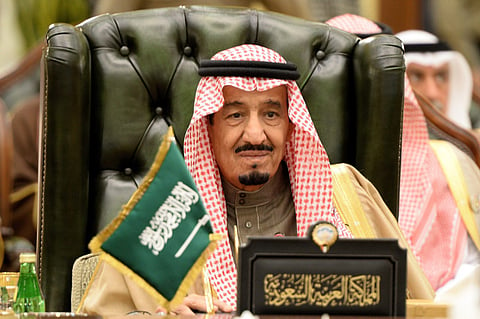Salman’s agenda and new Saudi strategy
If the new administration can build a reliable alliance of three capitals to meet threats from terrorists and from Iran, it could send a clear message to all

For the past few weeks, the Saudi capital Riyadh was at the centre of attention regionally and worldwide. It was visited by Gulf leaders, and Egyptian President Abdul Fattah Al Sissi. And later Turkish President Recep Tayyip Erdogan and the presidents of both South Korea and Pakistan, followed by US Secretary of State John Kerry. These visits are only to be expected, given the enormity of the events engulfing the region. Saudi Arabia is leading the Gulf region towards a new phase of diplomacy, and has a vision for the future.
The turbulence in Iraq and Syria, in addition to what is going on in Libya and Yemen are all of great importance for Egypt, the Gulf states and Turkey. Yemen borders Saudi Arabia and Oman; Libya is Egypt’s next door neighbour; Syria and Iraq border Turkey.
The common wisdom in the region is to not rely on western allies, as they have their own priorities and agendas. We have to take care of our problems ourselves. Before leaving his country, Al Sissi spoke to the media, saying Egypt must have a military pact with Saudi Arabia and other Gulf states — not to attack others, but to defend our countries. The Gulf states, showing their dissatisfaction with what is going on in Yemen, decided collectively to send their ambassadors to Aden, in support of the legitimate President Abd Rabbo Mansour Hadi, who fled from captivity in Sana’a, defying Al Houthis, who immediately called upon Tehran for help. They have close ties with Iran, and have recently launched 14 flights a week between Yemen and Iran.
This is not justified by either the volume of trade or passengers between the two countries. It was designed for other reasons, such as flying in arms and experts highly needed by Al Houthis. The scene has been set for confrontation; building new and strong alliances to counter this approach by Tehran and its allies, is what tops the agenda of decisions-makers in Riyadh: an axis from Cairo to Ankara to Riyadh, passing through the Gulf capitals, cemented by Muslim and other allies, like Pakistan and South Korea respectively. This is what is needed to confront not only the terrorist groups but also attempts by Tehran to extend its hegemony over the region. Nobody so far knows what the Americans have in mind vis-avis negotiations with Tehran, over its nuclear programme which are due to conclude by the end of this month. Conflicting messages are emerging; even America’s closest regional ally, Israel, is at odds with the current US administration, especially on its vague plans to deal with Tehran’s nuclear issue. The Gulf countries, led by Saudi Arabia, appear not to be taking chances. They are preparing for the worst outcome.
If the new Saudi administration can build a reliable alliance of three capitals to meet both threats from terrorists and from Iran, it could send a clear message to all, friends and foes, that the region will not any more accept the status quo, imposed from outside, or to be a playground for others’ interests or conflicts.
The information available so far is that there are is sort of agreement between Washington and Tehran, but at whose expense nobody is certain. The Gulf states suspect that this kind of agreement alluded to by US officials probably will be at the cost of their interests and national well-being. People in charge of Riyadh’s new strategy are facing a few obstacles to building a reasonable resistance front. The major obstacle is to bring Egypt and Turkey together to see the common threats. Turkey agrees with Saudi Arabia’s policy towards the Syrian regime but is at odds with Cairo’s stance towards the Muslim Brotherhood. Egypt looks at the group as being against the establishment and brands it a terrorist organisation. Ankara sees it as a legitimate political force. Bringing them together seems awkward for Saudi diplomats. There were some hints by Saudi writers and commentators that Riyadh was doing its best behind the scenes, to make the two parties see the common danger, and the trio can, if they come together, counter both extremists and Tehran’s expansionist policies. It will be a hard diplomatic manoeuvre but not impossible. The idea of “reconciliation” is in the air, and is being widely discussed in the Egyptian media these days. Probably its needs some time to be implemented, when conditions and terms of this reconciliation are negotiated. But the train has already left the station. It looks likely that a reformed Muslim Brotherhood could be allowed even to participate in coming Egyptian parliamentary elections in few months’ time. If this happens, it will be clear that the King Salman’s new diplomacy is triumphing, and the Saudis are again in the driver’s seat.
Mohammad AlRumaihi is a professor of political sociology at Kuwait University. You can follow him on Twitter at www.twitter.com/@rumaihi42



